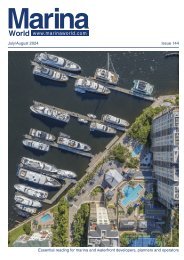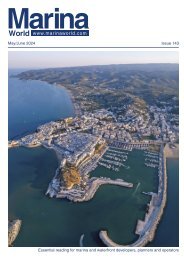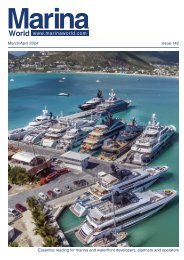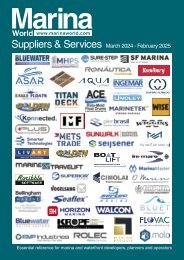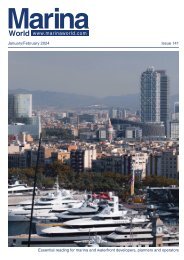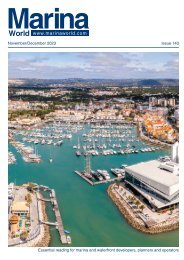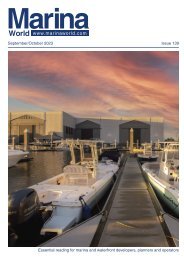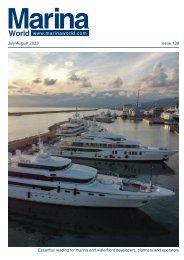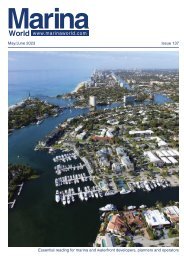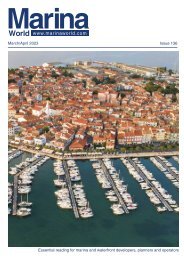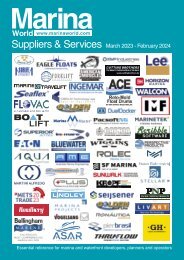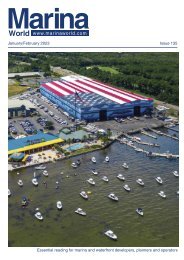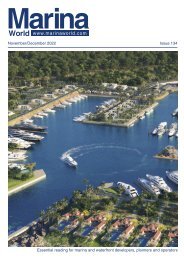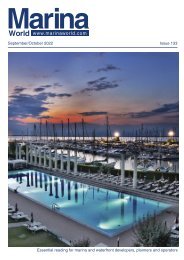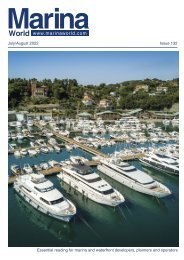Create successful ePaper yourself
Turn your PDF publications into a flip-book with our unique Google optimized e-Paper software.
CRISIS MANAGEMENT<br />
The day after<br />
How is the marina industry going to handle going back to business after this<br />
scary, almost science-fiction COVID-19 medical and social experience? Oscar<br />
Siches shares his thoughts<br />
Most of us live in countries that<br />
have already started to ease strong<br />
confinement measures, and an<br />
educated guess that many people<br />
will be able to use their boats with<br />
minimal restrictions by mid-<strong>June</strong> is<br />
not at all daring. Most governments<br />
forget about the singularities of marine<br />
recreational activities and place the<br />
whole group of users under “maritime”<br />
or “transport” or, at best, “fishing”. This<br />
confirms the need for us to create<br />
a strong relationship with the state<br />
administration. If we inform them it will<br />
help ensure the continuity of our sport<br />
without big hiccups.<br />
Many associations big and small are<br />
issuing guidelines for yacht harbour<br />
behaviour on and after the re-opening<br />
of facilities. Invariably, 80% of the<br />
papers enumerate procedures for<br />
personal cleaning, social distancing,<br />
mask wearing, glove availability, i.e.<br />
information that everybody has listened<br />
to over the past weeks, when TV and<br />
social media saturated us to exhaustion<br />
with such messages. There’s no merit<br />
in repeating all of this information.<br />
Some organisations went a step<br />
further and created a protocol for the<br />
use of the facilities. They organised<br />
way-in and way-out paths, time slots for<br />
bathroom and shower use, circulation on<br />
piers and pontoons and right of way in<br />
gangways; procedures that are easy to<br />
understand and follow. Booking offices<br />
helped by sending out crew/passenger<br />
lists and ETAs ahead of schedule, and<br />
outlining procedures for check-in and<br />
check-out for charter boats, all of which<br />
helped to reduce the risk of catching the<br />
disease. And one very important thing<br />
has not changed. Once you embark on a<br />
boat and cast off, the oceans are yours,<br />
and the limits are the ones you set<br />
between the boat and the universe.<br />
There is, however, another very<br />
important thing, which I feel is missing<br />
in all the ‘guidance’: the human element.<br />
The people who have received an extra<br />
blow by losing family or friends, losing<br />
their jobs, their income, the stability<br />
they’ve gained after years of doing their<br />
best in life. People like this are also<br />
part of the marina industry. They are<br />
self-employed mechanics, sail repair<br />
craftsmen, electricians, metal workers,<br />
chefs and waiters in marina restaurants.<br />
With the recent relaxation of isolation<br />
rules and partial opening of many<br />
marinas and yacht harbours, the<br />
guidelines for user behaviour developed<br />
by various associations in many<br />
countries and especially those put<br />
forward by the International Council of<br />
Marine Industry Associations (ICOMIA)<br />
are being put into practice. But there<br />
is scant attention given to the small<br />
service companies trying to keep their<br />
employees but facing very low demand<br />
as users are encouraged to go directly<br />
to their boats, and when coming back,<br />
to move boat-to-car nonstop. We should<br />
not view them as new pariahs and lock<br />
them away in an emotional safe where<br />
everything unpleasant or inconvenient<br />
is stored until it fades away. They are<br />
part of the industry. They are less lucky<br />
than us (of course we are suffering<br />
too) but they should not be forgotten or<br />
abandoned.<br />
The nautical industry in general and<br />
the yacht harbour/marina industry<br />
in particular share something very<br />
specific: we are bound by the sea, its<br />
freedom and its dangers. A marine<br />
engine technician will share tacitly with<br />
a dockhand or a yacht owner more<br />
feeling of belonging to things nautical<br />
than a vacuum-cleaner assembler will<br />
share with a home owner, or a factory<br />
car wheel fitter to a car dealer.<br />
That’s why I cannot understand that<br />
we are leaving people of our own to<br />
be left on their own during and after<br />
these extremely demanding times.<br />
Such behaviour does not belong to<br />
the nautical spirit. Of course, a human<br />
being’s instinctive reaction is to save<br />
him/herself first, followed by taking care<br />
of closest members (family). Thereafter,<br />
The Port of Palma, especially during the<br />
popular Palma Boat Show, has long been a<br />
vibrant meeting place throughout the year<br />
for boats and visitors enjoying a quality<br />
waterfront experience.<br />
www.marinaworld.com - <strong>May</strong>/<strong>June</strong> <strong>2020</strong> 25



